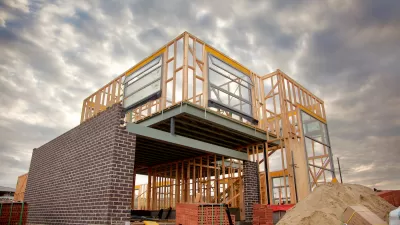Alternative models of homeownership involving shared equity may be able to offset the urban housing crunch. They include the subjects of this discussion: community land trusts and housing co-ops.

Although it often requires a high initial investment to secure land and buildings, shared-equity homeownership "can lower costs in the long run by preserving a city's affordable housing stock in perpetuity," Benjamin Schneider writes. In a primer on two popular shared-equity models, Schneider discusses the history of community land trusts (CLTs) and housing cooperatives, and goes over several examples of how residents have fared.
In the United States, CLTs own a total of about 15,000 home ownership units and 20,000 rental units. "By taking land off the real-estate market, they make the housing units they control permanently affordable. Community land trusts own the land upon which housing units are built, and sell or rent the units on top of it." Where they exist, CLTs tend to preserve some affordable options in gentrifying neighborhoods.
Co-ops are more of a mixed bag. "Since co-op tenants own the building, they can create rules that fit their needs, whether those are limited-equity agreements to keep units affordable, or arcane membership requirements that weed out the hoi polloi," Schneider writes.
Still, shared-equity homeownership is very much the exception to the norm. And for that to change, new mechanisms for funding them must become more readily available.
FULL STORY: CityLab University: Shared-Equity Homeownership

Maui's Vacation Rental Debate Turns Ugly
Verbal attacks, misinformation campaigns and fistfights plague a high-stakes debate to convert thousands of vacation rentals into long-term housing.

Planetizen Federal Action Tracker
A weekly monitor of how Trump’s orders and actions are impacting planners and planning in America.

In Urban Planning, AI Prompting Could be the New Design Thinking
Creativity has long been key to great urban design. What if we see AI as our new creative partner?

King County Supportive Housing Program Offers Hope for Unhoused Residents
The county is taking a ‘Housing First’ approach that prioritizes getting people into housing, then offering wraparound supportive services.

Researchers Use AI to Get Clearer Picture of US Housing
Analysts are using artificial intelligence to supercharge their research by allowing them to comb through data faster. Though these AI tools can be error prone, they save time and housing researchers are optimistic about the future.

Making Shared Micromobility More Inclusive
Cities and shared mobility system operators can do more to include people with disabilities in planning and operations, per a new report.
Urban Design for Planners 1: Software Tools
This six-course series explores essential urban design concepts using open source software and equips planners with the tools they need to participate fully in the urban design process.
Planning for Universal Design
Learn the tools for implementing Universal Design in planning regulations.
planning NEXT
Appalachian Highlands Housing Partners
Mpact (founded as Rail~Volution)
City of Camden Redevelopment Agency
City of Astoria
City of Portland
City of Laramie





























